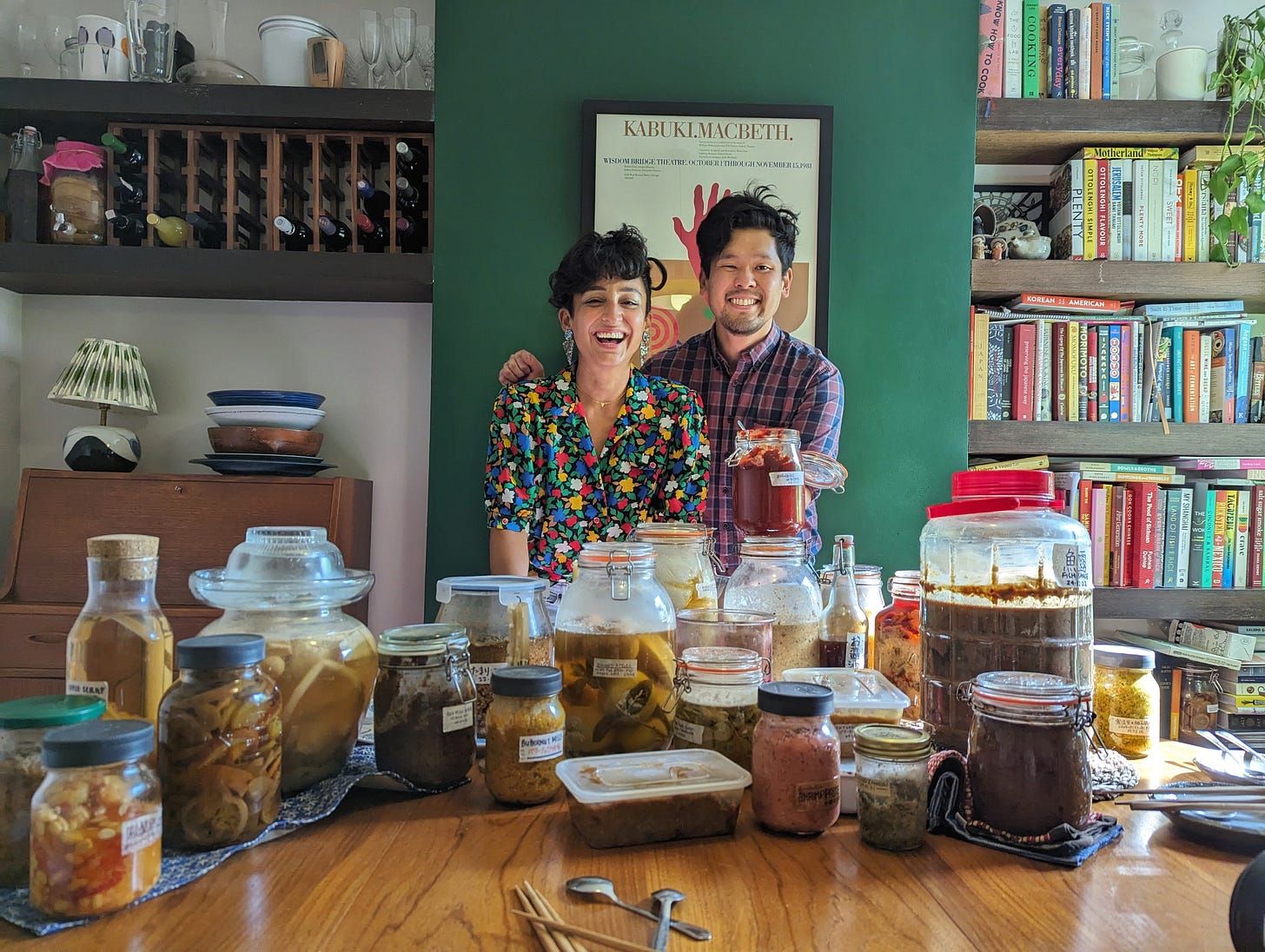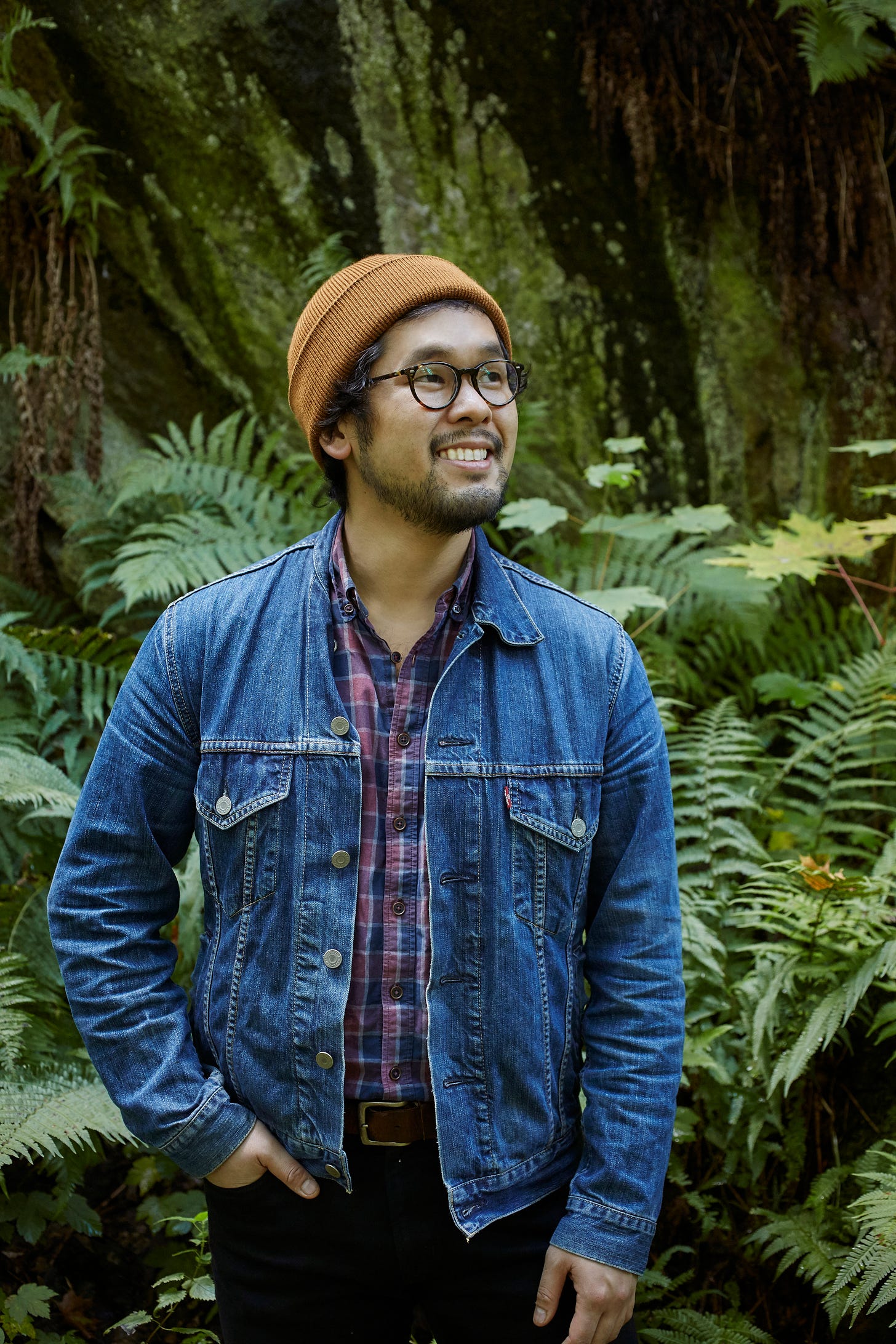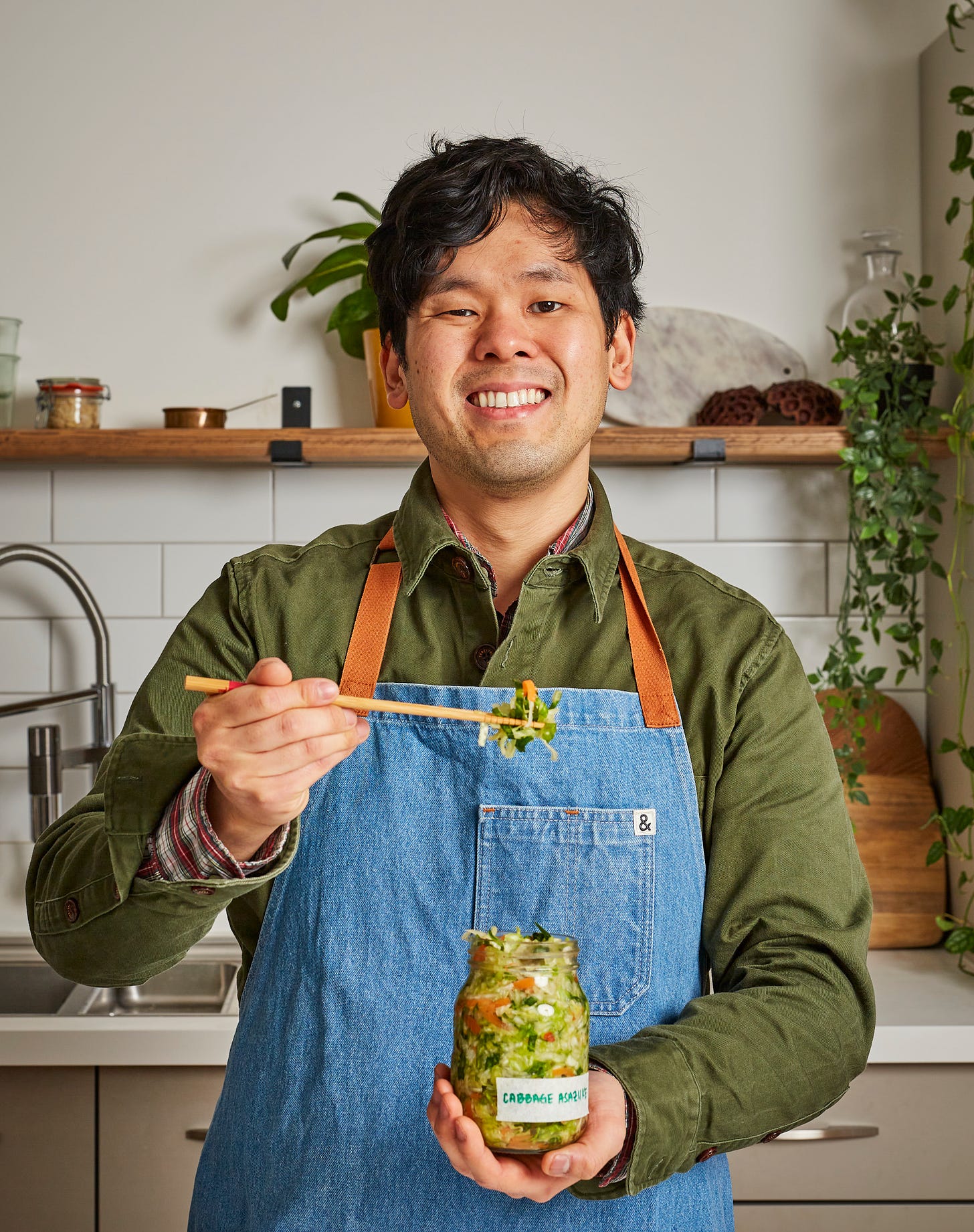'Take risks and follow your gut'
Japanese American food writer, Buddhist and fermenting fanatic, Kenji Morimoto, shares his day well spent
Hi! This is Leyla from A Day Well Spent, a newsletter seeking pathways to more purposeful living.
What subscribers received recently:
This is my daily sweet treat and it's actually good for me — a recipe
How we had a London wedding for less than £15,000 — with 📸 and 📽️
Sharing our favourite household hacks that simplify our daily lives
You can subscribe with your email to ensure you never miss my posts:
I am delighted to bring to you the next interview on A Day Well Spent where every few weeks, I ask someone who inspires me, interests me and embodies the ethos of this newsletter, 15 quickfire questions.
Fourth generation Japanese American, Kenji Morimoto, is a food writer living in London and we share a similar passion — fermenting (check out my guide on how to make kefir).
Kenji holds vast amounts of knowledge on the subject and I think he is doing such a brilliant job of portraying just how mind-bendingly cool, fascinating and downright delicious the world of fermentation and food preservation is, thanks to his creative, accessible and engaging social media videos.
I remember first coming across one of Kenji’s Instagram reels and thinking, this is excellent. I then met Kenji in real life when he was part of a British Library panel discussion I was hosting about fermentation. And last year, I shortlisted Kenji for the Digital Creator Award at the BBC Food and Farming Awards 2023 - a huge achievement!
He is the resident fermentation expert at ZOE, teaches fermentation workshops, is published in Waitrose Magazine and Delicious Magazine and is also currently working on his first cookbook.
Kenji’s cultural identity has always been grounded in food and it’s through the art of fermentation that he connects the dots between diasporic traditions and his own.
I think he is a wonderful representation of how the simple but radical act of preserving food can reignite our latent ancestral memories, nourish our spirit and offer a more connected lens through which to view the world.
Thank you for answering these questions, Kenji!
Interviews here will always be free to read. If you would like me to continue curating them for you to enjoy — along with all the other writing on A Day Well Spent (here’s the full archive of 100+ articles) — why not consider becoming a member for the price of just two coffees a month. It would be my pleasure to welcome you.
And did you know: the simple, free and meaningful act of hitting the heart icon ❤️ above, or sharing this piece, makes it easier for people to find this newsletter. Should you do this, I see you and it is so appreciated. Thank you.
1. What makes up a day well spent for you?
One of activity and creation, where I’ve surrendered to the senses and go to sleep with the satisfaction of productivity, but productivity that I’ve defined. Keeping busy keeps me content; my mind tends to wander so focused tasks with tangible results put me at ease.
Gardening in the early morning, birdsong and my dogs keeping me company, my hands covered in dirt reminding me of my family’s farming origins in Japan. Preserving, pickling, and fermenting in the late afternoon sun, catharsis in chopping and fingers wrinkled from salt: what flavour combination can I explore today?
And in the evening, taking stock of my jars, projects (and memories) unearthed, course correcting, and notes taken. And mint tea.
2. What compliment have you received in recent times that's stuck in your memory?
That I hustle, and hustle well.
Between content creation, recipe development, talking gigs, and a fulltime job with two dogs at home, I balance many spinning plates. I don’t want to glamourise hustle culture and I have flirted with burnout many times. But I view hustle culture a bit differently.
Life is short and there will always be hundreds of reasons not to do something, so as long as I’m mentally (and physically) healthy and maintain agency in my decisions, why not?
3. What quotes or mantras do you try to live by?
“My life is not only my life but the life of others’ sacrifices”
I was raised a Buddhist and Sensei Ogui would always talk to us about this during our weekly Sunday services in Chicago. My Japanese American immigrant story was always front of mind, intergenerational trauma presenting itself in so many ways of which I’ve only appreciated with age.
I live with a strong devotion to family and now being far from that, I endeavour to actively remember and pay homage to those who came before me, and sacrificed so much to give me the life I currently lead.
Perhaps this is nostalgia, a mantra reminding me of a time that was and hardships endured by my community. But this yearning is also a catalyst for the legacy I want to leave.
4. What practical skill do you have that you value the most?
Probably not a surprising answer but preservation in the home kitchen, both fermentation and pickling. I truly believe it’s a radical act of self-sufficiency and empowering in how we can create, transform, and maintain flavour and nutrients, driven by intuition and handed down to us by our ancestors.
Some of my first Japanese pickles (tsukemono) recipes were taught to me by my maternal grandmother when I was a child, and this laid the foundation of my culinary pursuits. This was further developed during my time living abroad — namely in Mumbai, NYC, Hong Kong, and (now in) London — and it was through these experiences I learned how to adapt recipes to locality, focus on accessibility, and connect global traditions in my home kitchen.
5. What do you know today that you wish you'd known five years ago?
Take risks and follow your gut.
I lived a fairly risk-averse life throughout my adolescence, with a clear path of grades and extracurriculars which I viewed would lead to success.
It did (in many ways) but I quickly realised that my path was diverging from the familiar and with that I started taking risks but trusting my gut. From moving across the globe from Hong Kong to London to follow a guy, to investing time and energy into my food career.
That guy is now my husband, and my food career is starting to take off with some very exciting milestones on the horizon.
So trust your gut (no pun intended).

6. What character or personality trait about yourself do you value the most?
I don’t get bored — I have endless interests and hobbies and am perfectly content on my own (which is funny given I spend my day job surrounded by people).
7. What does 'eating well' mean to you and how do you manage it?
Variety in texture, flavour, and colours. I’m not a vegetarian but I tend to focus on vegetables when I cook for myself and when I do cook meat, I aim to buy the best quality I can afford.
And preparation: less about meal planning but more intentional cooking. Mindfulness in what I buy, in how I think about a dish or a meal, and how I appreciate the food. Very relevant to my mantra!
8. What is your ultimate dream?
A massive garden, a few (more) dogs, a handful of chickens, and a stoic cat. And a fermentation and pickling studio (ideally at the back of the garden).
9. What's your most loved skincare / beauty product or secret?
Korean face masks. They’re a small (and affordable) luxury and allow a meditation in mindfulness. And fermented products — they do a tremendous amount for you both physically and mentally.
10. How do you counter the fast-paced and immediate nature of today's world?
Ferment! This is my antidote to a busy life.
As I referenced in my day well spent, I often like to end my days in the kitchen and really observe what’s happening in my jars. Is course correction needed? How has the environment — humidity, temperature, percentage of salt or sugar — impacted my miso? Or my sauerkraut? Is yeast blooming where vegetable meets oxygen in my lacto-fermented hot sauce?
Focus on what’s within my control and trust the process. It’s in these moments I feel most Buddhist, grounding me in this crazy modern existence and reminding me to slow down and be present.
11. What are your hobbies and interests? What do you like to do in your free time?
Besides fermenting, pickling, and cooking, which monopolise the majority of my free time, I enjoy learning languages, and specifically learning alphabets.
I’ve always had a love of foreign scripts (there was a time I could read and write eight scripts (!!) although I had no idea what I was reading or writing…) and view languages as puzzles and boy do I get satisfaction out of cracking one.
12. What's the latest thing that you have learnt?
Whittling. I spent a few hours whittling a spoon from cherry wood at Glastonbury last year and I loved it. Yes, it was a necessary break during a rather full on festival but it’s now become a wee bit of a hobby and I am pleased to say that I’m currently working on a bird.
Truth be told it kind of looks like a doorstop and I’m clearly not becoming a master whittler anytime soon. But I find it liberating to learn something purely for the sake of learning with no intentions for anything greater.
13. Tell us about something you tried or did for the very first time recently
A mangosteen! My husband recently moved to Vietnam and I became obsessed with the variety (and quality) of produce there, but particularly all of the fruit!
14. What book should everyone read and why?
On Earth We’re Briefly Gorgeous by Ocean Vuong. It’s painfully beautiful and a lyrical story that must be told (and read).
15. What are you working on that we should know about?
I am working on my debut cookbook! Can’t reveal much beyond that but watch this space ;) All updates (and fermented / third culture food content) will be shared on my Instagram @kenjicooks.
If you enjoyed this piece, you might like to check out the other interviews on A Day Well Spent.
🎧 On an unrelated topic, you can catch me presenting the latest episode of BBC Radio 4’s The Food Programme called D-Day - The Food that fuelled the assault — listen via BBC Sounds or wherever you usually get your podcasts from.



